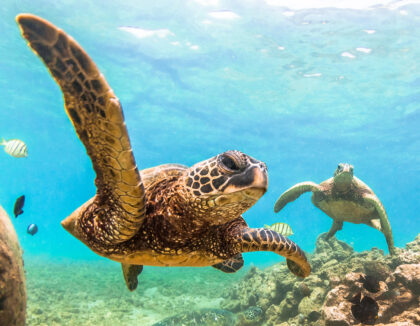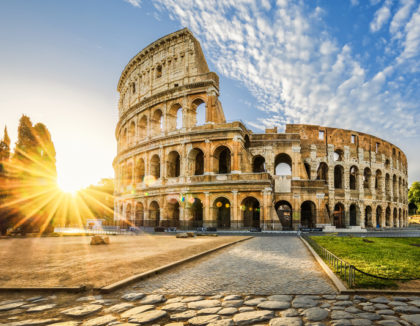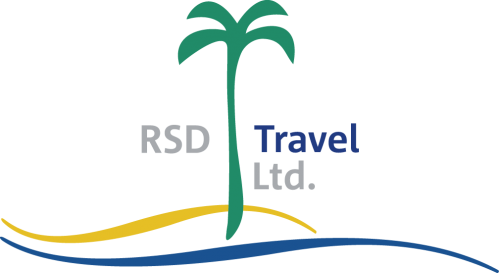National information on Malta
Temperatures Malta – Valetta
| Jan | Feb | Mar | Apr | May | Jun | Jul | Aug | Sep | Oct | Nov | Dec |
| Valetta | 16 | 19 | 20 | 24 | 26 | 30 | 34 | 34 | 30 | 26 | 22 | 19 |
| London | 6 | 7 | 9 | 13 | 18 | 20 | 22 | 21 | 20 | 13 | 10 | 7 |
General note:
Below is an information overview. The conditions of entry, as well as the political and health situation, can change anywhere in the world at any time. We therefore recommend checking before your trip. Please check the website of the Foreign Office (www.gov.uk) before your depart.
Location:
The Mediterranean island state of Malta comprises the main island of Malta, the smaller islands of Gozo and Comino and the uninhabited isles of Cominotto, Filfla and St. Pauls. Spanning a total area of 122 square miles, the main island of Malta accounts for 247 square kilometres. The group of islands is 58 mi south of Sicily and 180 mi north of the North African coast.
Capital:
Valetta (approx. 15,000 in the capital region)
Form of government:
Republic (member of the Commonwealth) since 1974. Constitution of 1974, last amended 1987. Independent since 1964 (former British crown colony). Malta is a member of the EU.
Religion:
97% of the population is Roman-Catholic.
Language:
The official languages are Maltese and English. Italian is widely spoken.
Climate:
Malta has a subtropical to Mediterranean climate, i.e. hot and dry summers with temperatures of up to 32 degrees Celsius and mild but humid winters. Various winds provide welcome cooling in Malta in summer, while in the winter months they bring occasional rain showers.
Electricity:
The Maltese power network is supplied with 220/240V alternating current. As in the UK, power outlets have three rectangular openings arranged in a triangle.
Local time:
Malta is part of the Central European Time zone where GMT+1 applies, along with daylight saving time. Malta is one hour ahead of UK time, all year around.
Making telephone calls:
The country code for Malta is 00356. Malta, Gozo and Comino do not have area codes. To call the UK from Malta, please dial 0044 and the area code without the zero.
The country and its people:
The landscape of the three inhabited islands is characterised by hills and terraced fields. Malta does not have any mountains or rivers. Harbours, inlets, pretty sandy beaches and rocky bays can be found along the coast. Gozo is accessible from Malta by ferry and offers sumptuous vegetation, gently rolling hills and rugged cliffs. Comino is the smallest island and can be reached by ferry from both Malta and Gozo.
Entry requirements for British citizens:
If you are planning to travel to an EU country you must meet the Schengen area rules. Your full ‘British citizen’ passport must meet 2 requirements. It must be:
– less than 10 years old on the day you enter (check the ‘date of issue’)
– valid for at least 3 months after the day you plan to leave (check the ‘expiry date’)
You can travel to countries in the Schengen area for up to 90 days in any 180-day period without a visa. Check your passport is stamped if you enter or exit the Schengen area through Malta as a visitor. Border guards will use passport stamps to check you are complying with the 90-day visa-free limit for short stays in the Schengen area. If relevant entry or exit stamps are not in your passport, border guards will presume that you have overstayed your visa-free limit.
From November 2024, the new EU Entry/Exit System (EES) will start for all non-EU nationals, including British nationals, travelling in or out of the Schengen area. The Schengen area is made up of 29 European countries, 25 of which are EU Member States. The EES is a digital border system which registers non-EU visitors travelling into the Schengen area instead of stamping their passports. You will need to have your fingerprints and your photo taken when entering the Schengen area. You may experience longer queues at borders when the new system starts (https://travel-europe.europa.eu/ees_en).
Nationals of other countries are advised to enquire at the Spain Embassy about the entry requirements applicable to them. Whilst we endeavour to provide guidance where necessary, we cannot be responsible for any problems encountered (whether at any point of entry or elsewhere) in the event that passport and visa requirements are not satisfied. For more information, please visit https://www.gov.uk/foreign-travel-advice/.
At Maltese border control, you may also need to show a return or onward ticket and prove you have enough money for your stay. If you hold a different type of British nationality (BN(O), British Overseas Citizen, British Protected Person or British Subject), check visa requirements with the Maltese Embassy before you travel. However, passport and visa requirements change from time to time and are also dependent on the purpose of your visit and your nationality. Whilst we endeavour to provide guidance where necessary, we can not be responsible for any problems encountered (whether at any point of entry or elsewhere) in the event that passport and visa requirements are not satisfied. For up-to-date information on entry requirements, please visit www.gov.uk/foreign-travel-advice/.
The EU has a new visa waiver system (coming in 2025), called ETIAS, which will be valid for three years. British passport holders travelling to the EU will need to apply and pay for an ETIAS, via an online system (https://etias.com/).
Tour guides:
Your expert tour guides will be able to provide you with detailed information about the country, people, history, culture, etc., and offer advice and assistance for organising your trip. They can also help with room allocation and look forward to welcoming you with initial information. Here you will find out all you need to know and useful information about the trip. We have put together a varied programme including numerous highlights, enabling you to experience the culture and diversity of landscape that Malta has to offer, and learn all about the country and its people.
Additional packages:
Although your trip already includes a comprehensive package, you also have the option of choosing added extras. We recommend booking the following packages:
Gourmet package: The package includes half-board, i.e. tasty buffet every evening with local and international specialties: only £179* per person.
Explorer package: The package includes the full-day excursion ‚Country & People‘ and the half-day excursion ‚Mysterious Malta‘: only £119* per person.
* Package prices may vary when booking on site.
Environmental tax:
In Malta, a environmental tax of €0.50 (approx. £0.42) per person/night but maximum €5.00 (approx. £4.22) per person/stay is charged (as of September 2024).
Currency / Banks / Credit cards:
The Euro has been the official Maltese currency since 1 January 2008. Exchange rate (as of September 2024): 1 EUR = 0,84 GBP; 1 GBP = 1,18 EUR Cards bearing the Cirrus or Maestro symbol, as well as the common credit cards are accepted as means of payment. Cash can be withdrawn with bank and credit cards at the numerous ATMs available.
Customs regulations:
On entering or travelling through Malta, cash (in any currency) or easily convertible valuables (bonds, travellers‘ cheques etc.) to the value or equivalent of €10,000 (8,440 GBP) or more must be declared. Alcoholic beverages and tobacco products imported for non-commercial purposes by persons travelling from non-EU countries to Malta are exempted from excise duty. Such exceptions from consumption taxes are subject to the limits stated on the following website: https://www.maltairport.com/passenger/security-passport-control/customs/. Items requiring special permits (e.g. arms) will be held for safekeeping by the customs authorities until such permits are issued.
Important: If you are travelling to Great Britain from outside the UK, your personal allowances mean you can bring in a certain amount of goods without paying tax or duty. If you go over your allowances you must declare all your goods and pay tax and duty on all the goods in that category. Please inform yourself about the current customs regulations: https://www.gov.uk/bringinggoods-into-uk-personal-use/arriving-in-Great-Britain
Special criminal regulations:
Penalties for illegal drugs possession, use or trafficking are strict. Convicted offenders can expect prison sentences and heavy fines.
Medical information:
At least 8 weeks before your trip, check the latest country-specific health advice from the National Travel Health Network and Centre (NaTHNaC – https://travelhealthpro.org.uk/countries) on the TravelHealthPro website. Each country-specific page has information on vaccine recommendations, any current health risks or outbreaks, and factsheets with information on staying healthy abroad. Note: Persons who are sensitive to the sun should wear longsleeved clothing and protective sun cream offering a high sun protection factor as the sun intensity and ozone pollution are significantly stronger than in the UK. In summer and early autumn, hot and humid weather can exert great pressure on your heart and circulatory system; in autumn and winter, the respiratory system in particular can be affected by the damp and cool weather. Rheumatic complaints also arise during longer stays in Malta on account of the prevailing conditions. Tap water is a mixture of groundwater and desalinated seawater and should only be drunk after boiling.
Medical care:
The state healthcare system works well; the Mater Dei Hospital is the central hospital for maximum care, although it does not meet British standards. There are small polyclinics and a few private hospitals (e.g. Saint James Hospital) spread across the island.
You should get a free UK Global Health Insurance Card (GHIC) or European Health Insurance Card (EHIC) before leaving the UK. If you already have an EHIC it will still be valid as long as it remains in date. You can also contact your health insurance company for information on current regulations. Nonetheless, you are urgently recommended to take out travel health insurance for the duration of your holiday which covers risks not assumed by the statutory health insurance companies (e.g. repatriation to the UK in the event of illness, treatment by private doctors or in private hospitals). Such policies usually also offer benefits not covered by state health insurance companies, e.g. the costs of repatriation.
The customer must establish for himself that his physical and mental state is compatible with the selected journey. He is obliged to obtain information about the degrees of physical mobility and mental autonomy required for this journey.
All information is subject to change/Last updated: September 2024
back Information & tips
 Travel highlights
Travel highlights
 Europe
Europe
 Asia
Asia
 America
America
 Africa
Africa
